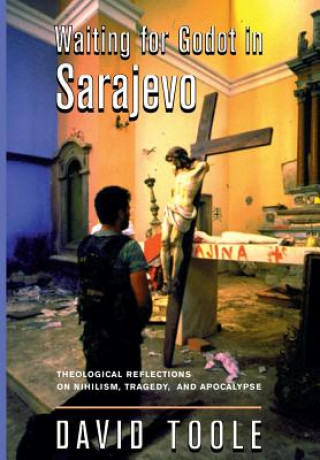
Kod: 11534646
Waiting for Godot in Sarajevo: Theological Reflections on Nihilsim, Tragedy, and Apocalypse
Autor David Toole
In the summer of 1914, Archduke Franz Ferdinand was assassinated in Sarajevo, an event which led to the horror of World War I and which many historians suggest marked the beginning of the twentieth century. In 1992, Sarajevo again ... więcej
- Język:
 Angielski
Angielski - Oprawa: Twarda
- Liczba stron: 356
Wydawca: Westview Pr, 1998
- Więcej informacji o książce

161.73 zł
Zwykle: 163.50 zł
Oszczędzasz 1.77 zł

Dostępna u dostawcy
Wysyłamy za 14 - 18 dni
Zobacz książki o podobnej tematyce
-
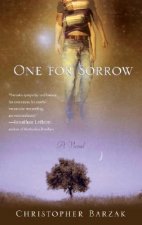
One for Sorrow
77.75 zł -1 % -

Sierra Six-Guns
32.64 zł -25 % -
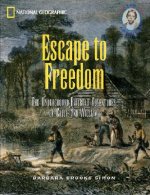
Escape to Freedom
40.17 zł -11 %
Bon podarunkowy: Radość gwarantowana
- Podaruj bon o dowolnej wartości, a my się zajmiemy resztą.
- Bon podarunkowy dotyczy całej naszej oferty.
- Możesz wydrukować elektroniczny bon z e-maila a następnie przekazać go obdarowanemu.
- Ważność bonu wynosi 12 miesięcy od daty wystawienia.
Więcej informacji o Waiting for Godot in Sarajevo: Theological Reflections on Nihilsim, Tragedy, and Apocalypse
Za ten zakup dostaniesz 94 punkty
 Opis
Opis
In the summer of 1914, Archduke Franz Ferdinand was assassinated in Sarajevo, an event which led to the horror of World War I and which many historians suggest marked the beginning of the twentieth century. In 1992, Sarajevo again lurched into prominence as the focal point of one of the century's bloodiest civil wars. Yet Sarajevo at one point had epitomized the dreams of the Enlightenment, a city where Christians, Jews, and Muslims peacefully coexisted. In the midst of Sarajevo's recent decline into chaos and destruction, Susan Sontag decided to produce Act I of Waiting for Godot, which, despite ever-looming danger, played to packed houses. Why? Why did this city of hope lie crushed at the end of the twentieth century? Why did Sontag stage an artistic production in the middle of such overwhelming tragedy? Why Waiting for Godot? And, most important, why the appreciative, silent tears of audience members who risked their very lives to attend a play in the middle of a war?These are the questions which guide David Toole's theological reflections in Waiting for Godot in Sarajevo, where he seeks to come to terms with what it means to live a life of dignity in a world of undeniable suffering. Toole skillfully weaves together Friedrich Nietzsche's views on nihilism together with Michel Foucault's politics of power to produce a politics of tragedy, or a "politics of dying". Along the way, he draws innovative connections between such diverse figures as John Milbank, Alisdair MacIntyre, Euripides, John Howard Yoder, and even Norman Maclean (author of A River Runs Through It and Young Men and Fire), all the while using Beckett's play as a compass for his direction. The end result is afascinating, eminently readable, unexpectedly adventurous theological inquiry into the meaning of life.
 Szczegóły książki
Szczegóły książki
161.73 zł
- Pełny tytuł: Waiting for Godot in Sarajevo: Theological Reflections on Nihilsim, Tragedy, and Apocalypse
- Autor: David Toole
- Język:
 Angielski
Angielski - Oprawa: Twarda
- Liczba stron: 356
- EAN: 9780813335032
- ISBN: 0813335035
- ID: 11534646
- Wydawca: Westview Pr
- Waga: 658 g
- Wymiary: 237 × 158 × 30 mm
- Data wydania: May 1998
Ulubione w innej kategorii
-

Dune
50.32 zł -3 % -

Haunting Adeline
125.47 zł -1 % -

Berserk Deluxe Volume 2
212.67 zł -1 % -

White Nights
10.94 zł -28 % -

Powerless
48.61 zł -11 % -

Atomic Habits
57.35 zł -28 % -

Dune Messiah
46.20 zł -3 % -

Berserk Deluxe Volume 3
217.79 zł -3 % -

One Day
34.25 zł -44 % -

Berserk Deluxe Volume 1
211.26 zł -2 % -

Iron Flame
60.97 zł -28 % -

Surrounded by Idiots
36.66 zł -28 % -

Harry Potter and the Prisoner of Azkaban (Minalima Edition)
169.97 zł -2 % -

Gravity Falls Journal 3
89 zł -

Heaven Official's Blessing: Tian Guan Ci Fu (Novel) Vol. 1
86.99 zł -3 % -

The Creative Act
102.66 zł -12 % -

Dune
47.21 zł -23 % -

Hunting Adeline
125.97 zł -4 % -

A Little Life
48.61 zł -11 % -

Children of Dune
46.61 zł -2 % -

Heaven Official's Blessing: Tian Guan Ci Fu (Novel) Vol. 2
77.55 zł -14 % -

Bungo Stray Dogs, Vol. 8 (light novel)
65.39 zł -4 % -

Percy Jackson and the Olympians 5 Book Paperback Boxed Set
126.67 zł -34 % -

Solo Leveling, Vol. 1
86.49 zł -3 % -
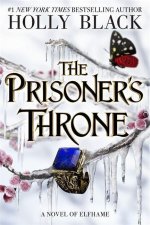
The Prisoner's Throne
44.80 zł -12 % -

Court of Thorns and Roses
35.25 zł -28 % -

Cry Baby Coloring Book
47.21 zł -1 % -
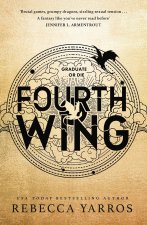
Fourth Wing
71.72 zł -15 % -

Icebreaker
37.46 zł -21 % -

Berserk Deluxe Volume 6
217.79 zł -3 % -

Avatar, the Last Airbender: The Kyoshi Novels (Box Set)
165.75 zł -4 % -

The 48 Laws of Power
98.24 zł -14 % -

House of Leaves
123.76 zł -3 % -

Twisted Lies
36.66 zł -28 % -
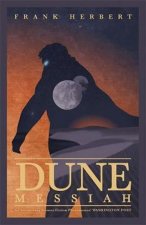
Dune Messiah
50.32 zł -12 % -

No Longer Human
56.35 zł -8 % -

48 Laws Of Power
60.97 zł -28 % -

Twisted Games
35.05 zł -31 % -

Caraval Paperback Boxed Set
175.10 zł -3 % -

Solo Leveling, Vol. 2
74.83 zł -23 % -

Open Circuits
168.97 zł -2 % -

Berserk Deluxe Volume 5
223.72 zł -

Heaven Official's Blessing: Tian Guan Ci Fu (Novel) Vol. 3
78.05 zł -13 % -

Berserk Deluxe Volume 4
208.35 zł -3 % -

Court of Mist and Fury
35.25 zł -28 % -

SOLO LEVELING V08
88.20 zł -1 % -

English File Upper Intermediate Multipack A (4th)
92.82 zł -1 % -

CHAINSAW MAN V14
43.49 zł -21 % -

Before the Coffee Gets Cold
36.16 zł -21 %
zadowolonych klientów
Od roku 2008 obsłużyliśmy wielu miłośników książek, ale dla nas każdy był tym wyjątkowym.
Copyright! ©2008-24 libristo.pl Wszelkie prawa zastrzeżonePrywatnieCookies


 21 milionów książek
21 milionów książek Dostawa 10.99 zł
Dostawa 10.99 zł (32) 444 93 66 (8-15.30h)
(32) 444 93 66 (8-15.30h)